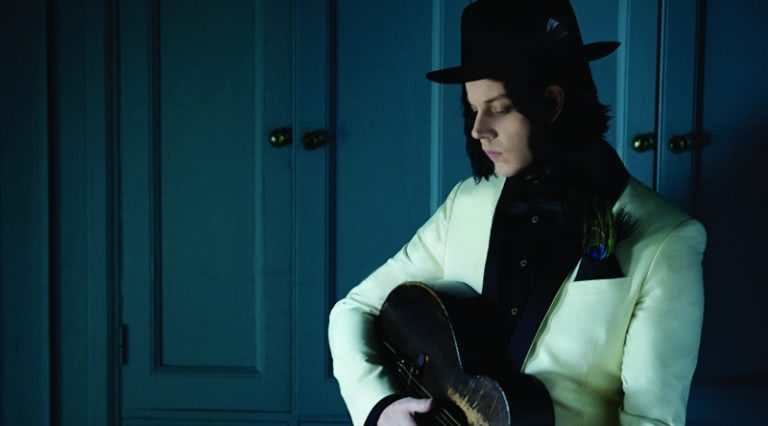Jack White’s position in pop culture is a complicated one. Few artists are as feted, yet so strangely opaque and confusingly contradictory, as the man born John Gillis in Detroit, Michigan.
Since taking on the name –and persona – of Jack White, he’s steadily worked his way through the levels of rock stardom’s crust, and burned not a few bridges (and relationships) behind him. Depending on your view of him, he’s either the man keeping the creative spirit of rock alive as its be-hatted, guitar-toting saviour, or a gimmick-pushing entrepreneurial charlatan; rock’n’roll’s version of Willy Wonka.
Having successfully reinvented himself as a solo artist on Blunderbuss –“I think I’ve been sort of like… not allowing myself to call an album ‘Jack White’ [from] when we started,” he says – White toured his debut outingwith two bands (the all-female Peacocks and the all-male Buzzards) for the next two years. Eventually he settled back into Nashville to write and record, all the while dealing with a divorce from then-wife Karen Elson.
As a result, Lazaretto (an old term for quarantine hospitals) is a very different record – bigger, more unrelentingly in your face. Moments like ‘Alone In My Home’ feel like the downer side to The White Stripes’ ‘My Doorbell’ from Get Behind Me Satan, while ‘That Black Bat Licorice’ is delightfully bonkers and ‘High Ball Stepper’ is a brutal stomper. But the overall feeling is one of deeper, darker reflection, if not resentment. It also sounds far more expansive than the characteristic, somewhat sparse, Jack White we’ve come to know.
This approach came about through the use of something White had never had before: time. Lazaretto is the record that the 38-year-old father of two has spent the longest working on –18 months –in his entire career; a move he made, he says, for family reasons. “When we finished touring at the end of the last record, I wanted to take a whole year off to be with my kids … a couple of years before that, I did take ten or 11 months off when my son was born to be with him as much as I could.
“And I thought, ‘Well, since I’m doing that anyway, why don’t I – for the first time in my life – work at an album for a really long time? What would that be like?’ I’ve never done that. But this, I was working on it for a whole year. Sometimes I really liked it, sometimes I didn’t like it at all. It was a lot of new things I’ve learned by doing [it that way]. I’m glad about that and I’m glad I’ve learned so many good things.”
No stranger to taking odd approaches to writing, White’s material on Lazaretto stems directly from his finding and using stories, poems and the like written by his 19-year-old self. While most of us would blanch at such an experience, it gave White a much-needed sense of perspective.
“I thought about my younger self, and to be an experienced person now and an inexperienced person then – what can I tell myself, or where can I take myself to turn into something new? You know, I wrote a lot of things back then,” he says.
“It wasn’t a scenario like, ‘Oh, I don’t have any ideas… thank God I found all these ideas!’” he laughs. “It wasn’t like that. These were ideas for something like a one-act play. A one-act play or a poem. They had nothing to do with music at all. To take that, rip it apart, and change into some other new things, or new songs – that was the idea. The music was all completely brand new as well. So it was interesting.”
He’s also adamant he’s not revealing as much as about himself on Lazaretto as people might believe. “I don’t think it says too much about me, personally, but it does say a lot about me as a songwriter and a producer. Because there’s definitely things I’ve never done before. So when I look at it or when I hear it, I go, ‘Wow! That’s not Jack White from The Raconteurs or that’s not Jack White from The White Stripes.’ This is Jack White from 2014, and I feel good about that. You know, in some ways, if I’m feeling, ‘Oh, it just sounds like I made another White Stripes record’ – I wouldn’t release it if I felt that way about it.”
Even with his recent, since-apologised-for remarks about former collaborator Meg and his bagging of The Black Keys, there’s no denying that being Jack White suits Jack White. His success has meant he’s been able to do things most artists would give their left arm for. Holographic vinyl releases; reissues of lost 1920s music; producing Neil Young at his Third Man studios; doing vinyl singles collections with artists from around the world – no matter what you make of him now, White is doing what he loves. So how does he feel about 19-year-old Jack today? “I just feel like he’s very lucky because he has got a whole world ahead of him,” he laughs.
Jack White’s second solo albumLazaretto is out now through Third Man/Columbia.


































